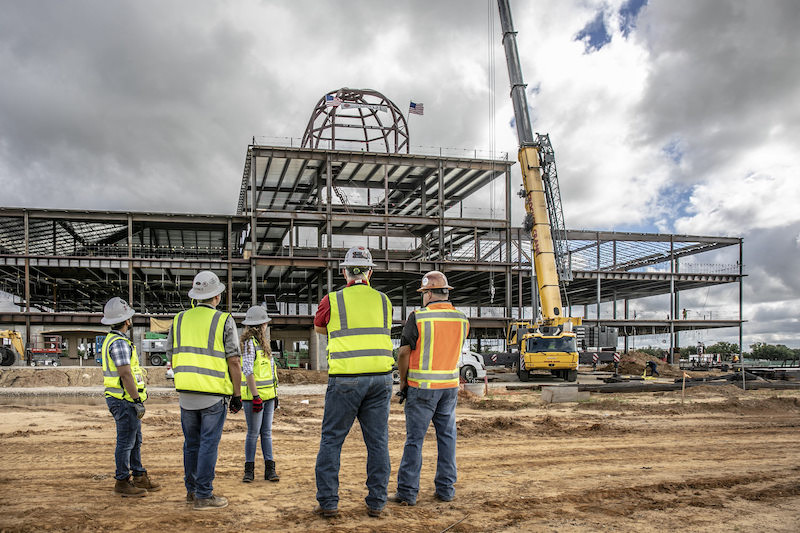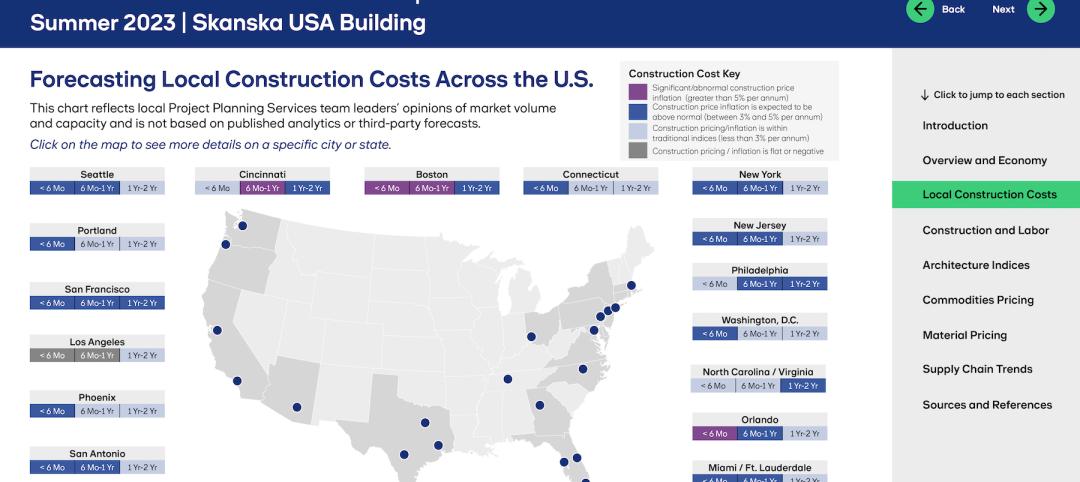The construction industry lost 3,000 jobs between July and August as ongoing declines in nonresidential segments offset a pickup among residential building and remodeling firms, according to an analysis by the Associated General Contractors of America of government data released today. Association officials said their newly released survey shows many contractors are eager to hire but are encountering a lack of qualified applicants and supply-chain delays that are holding back nonresidential employment gains.
“Today’s figures show that nonresidential building and infrastructure contractors are having a hard time recovering from the impact of the pandemic on demand for structures,” said Ken Simonson, the association’s chief economist. “At the same time, our survey finds many contractors have job openings but are experiencing a lack of qualified applicants, shortages of materials and long delivery delays.”
Construction employment in August totaled 7,416,000, a drop of 3,000 from July. Employment among nonresidential firms—comprising heavy and civil engineering construction firms, along with nonresidential building and specialty trade contractors—shrank for the fifth month in a row, by 20,300. In contrast, homebuilders and residential specialty trade contractors added 17,400 workers, the fourth-straight gain.
Despite the job losses for nonresidential construction firms, the association’s annual workforce survey, conducted with Autodesk, found many of its members—nonresidential and multifamily contractors—have unfilled job openings. Ninety percent of the more than 2,100 firms that responded had openings for hourly craft workers, while 62% had openings for salaried employees. Overwhelming percentages of firms with openings reported having a hard time filling positions, including 89% of the companies seeking craft workers and 86% of those looking for salaried employees.
Contractors are facing multiple challenges. Seventy-two percent of survey respondents reported that available job candidates were not qualified. Three-quarters of the firms reported projects were delayed due to longer lead times or shortages of materials, while 57% reported delivery delays.
Association officials called on officials in Washington to address both immediate and long-term needs for the construction industry. They urged lawmakers to finish work on the Senate-passed infrastructure bill and provide more funding for career and technical education programs that will attract and prepare more people for high-paying careers in construction.
“Contractors are eager to hire more workers but they need Washington officials to make sure there is enough funding for vitally needed infrastructure to justify hiring,” said Stephen E. Sandherr, the association’s chief executive officer. “In addition, more federal money should be going into preparing workers to execute these projects.”
Click here for the association’s survey results.
Related Stories
Apartments | Aug 22, 2023
Key takeaways from RCLCO's 2023 apartment renter preferences study
Gregg Logan, Managing Director of real estate consulting firm RCLCO, reveals the highlights of RCLCO's new research study, “2023 Rental Consumer Preferences Report.” Logan speaks with BD+C's Robert Cassidy.
Market Data | Aug 18, 2023
Construction soldiers on, despite rising materials and labor costs
Quarterly analyses from Skanska, Mortenson, and Gordian show nonresidential building still subject to materials and labor volatility, and regional disparities.
Apartments | Aug 14, 2023
Yardi Matrix updates near-term multifamily supply forecast
The multifamily housing supply could increase by up to nearly 7% by the end of 2023, states the latest Multifamily Supply Forecast from Yardi Matrix.
Hotel Facilities | Aug 2, 2023
Top 5 markets for hotel construction
According to the United States Construction Pipeline Trend Report by Lodging Econometrics (LE) for Q2 2023, the five markets with the largest hotel construction pipelines are Dallas with a record-high 184 projects/21,501 rooms, Atlanta with 141 projects/17,993 rooms, Phoenix with 119 projects/16,107 rooms, Nashville with 116 projects/15,346 rooms, and Los Angeles with 112 projects/17,797 rooms.
Market Data | Aug 1, 2023
Nonresidential construction spending increases slightly in June
National nonresidential construction spending increased 0.1% in June, according to an Associated Builders and Contractors analysis of data published today by the U.S. Census Bureau. Spending is up 18% over the past 12 months. On a seasonally adjusted annualized basis, nonresidential spending totaled $1.07 trillion in June.
Hotel Facilities | Jul 27, 2023
U.S. hotel construction pipeline remains steady with 5,572 projects in the works
The hotel construction pipeline grew incrementally in Q2 2023 as developers and franchise companies push through short-term challenges while envisioning long-term prospects, according to Lodging Econometrics.
Hotel Facilities | Jul 26, 2023
Hospitality building construction costs for 2023
Data from Gordian breaks down the average cost per square foot for 15-story hotels, restaurants, fast food restaurants, and movie theaters across 10 U.S. cities: Boston, Chicago, Las Vegas, Los Angeles, Miami, New Orleans, New York, Phoenix, Seattle, and Washington, D.C.
Market Data | Jul 24, 2023
Leading economists call for 2% increase in building construction spending in 2024
Following a 19.7% surge in spending for commercial, institutional, and industrial buildings in 2023, leading construction industry economists expect spending growth to come back to earth in 2024, according to the July 2023 AIA Consensus Construction Forecast Panel.
Contractors | Jul 13, 2023
Construction input prices remain unchanged in June, inflation slowing
Construction input prices remained unchanged in June compared to the previous month, according to an Associated Builders and Contractors analysis of U.S. Bureau of Labor Statistics Producer Price Index data released today. Nonresidential construction input prices were also unchanged for the month.
Contractors | Jul 11, 2023
The average U.S. contractor has 8.9 months worth of construction work in the pipeline, as of June 2023
Associated Builders and Contractors reported that its Construction Backlog Indicator remained unchanged at 8.9 months in June 2023, according to an ABC member survey conducted June 20 to July 5. The reading is unchanged from June 2022.

















